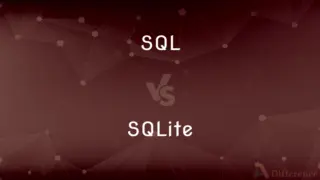FrostWire vs. LimeWire — What's the Difference?
By Tayyaba Rehman — Published on January 27, 2024
FrostWire is a free, open-source BitTorrent client, initially created as a fork of LimeWire. LimeWire was a popular P2P file-sharing program using the Gnutella network, discontinued due to legal issues.

Difference Between FrostWire and LimeWire
Table of Contents
ADVERTISEMENT
Key Differences
FrostWire: FrostWire began as a fork of LimeWire in 2004, but evolved to use the BitTorrent protocol and added additional features like cloud downloader and media player. LimeWire: LimeWire was launched in 2000, becoming one of the most famous P2P file-sharing platforms using the Gnutella network.
FrostWire: Unlike LimeWire, FrostWire expanded its functionality beyond Gnutella to include BitTorrent, which broadened its file-sharing capabilities. LimeWire: LimeWire remained focused on the Gnutella network and did not incorporate BitTorrent before its shutdown.
FrostWire: After LimeWire was shut down in 2010 due to legal issues, FrostWire gained popularity as an alternative, with continued updates and support. LimeWire: LimeWire was shut down by a court order in 2010 due to copyright infringement concerns, ceasing all its operations and development.
FrostWire: FrostWire is known for its user-friendly interface and has been consistently updated with new features. LimeWire: LimeWire, during its operation, was known for its simple, easy-to-use interface but faced criticism for enabling illegal file sharing.
FrostWire: It has integrated features like cloud downloader, media player, and Wi-Fi sharing. LimeWire: LimeWire did not have additional features like cloud downloading or integrated media playing functionalities.
ADVERTISEMENT
Comparison Chart
Origin
Fork of LimeWire in 2004
Launched in 2000
Network Protocol
BitTorrent and Gnutella
Gnutella Network
Post-2010 Status
Continued operation with updates
Shut down due to legal issues
Additional Features
Cloud downloader, media player, Wi-Fi sharing
Focused solely on P2P file sharing
Legal Status
Operates legally with open-source development
Ceased operations due to copyright infringement legal issues
Compare with Definitions
FrostWire
FrostWire is known for its user-friendly interface and community-driven development.
The regular updates to FrostWire show the strength of its developer community.
LimeWire
LimeWire was a popular P2P file-sharing program using the Gnutella network.
In the early 2000s, LimeWire was one of the go-to platforms for sharing music files.
FrostWire
FrostWire is a free, open-source BitTorrent client used for file sharing.
I downloaded my favorite band's concert video using FrostWire.
LimeWire
LimeWire faced criticism for enabling illegal file sharing.
LimeWire was often in legal hot water due to the unregulated nature of file sharing on its platform.
FrostWire
FrostWire offers features like cloud downloader and media player.
The integrated media player in FrostWire makes it easy to preview files.
LimeWire
It did not support the BitTorrent protocol and focused solely on Gnutella.
Unlike FrostWire, LimeWire only operated on the Gnutella network.
FrostWire
It provides file-sharing capabilities with an emphasis on legality and user safety.
FrostWire's commitment to legal file sharing sets it apart from other clients.
LimeWire
LimeWire was shut down in 2010 due to legal issues related to copyright infringement.
The shutdown of LimeWire marked the end of an era in P2P file sharing.
FrostWire
It began as a fork of LimeWire, but later included support for BitTorrent.
FrostWire has evolved significantly since its days as a LimeWire alternative.
LimeWire
It was known for its simple, easy-to-use interface.
LimeWire's user-friendly interface made it popular among non-tech-savvy users.
Common Curiosities
Can FrostWire be used legally?
Yes, FrostWire can be used legally, but users must ensure they only download and share content that they have the legal right to.
Was LimeWire legal?
While the LimeWire software itself was legal, it became associated with illegal file sharing, leading to its shutdown.
Why was LimeWire shut down?
LimeWire was shut down due to a court order for enabling and facilitating copyright infringement.
Does FrostWire support media playback?
Yes, FrostWire includes an integrated media player for playing downloaded files.
Is FrostWire safe to use?
FrostWire is generally safe to use, but like any file-sharing software, it requires users to be cautious about the files they download to avoid malware.
How did the legal issues of LimeWire affect its users?
The legal issues led to the shutdown of LimeWire, forcing its users to migrate to other file-sharing platforms.
What is FrostWire mainly used for?
FrostWire is used for downloading and sharing files via the BitTorrent protocol and Gnutella network.
What type of files were commonly shared on LimeWire?
LimeWire was commonly used to share music files, but users also shared videos, software, and documents.
What made LimeWire popular?
LimeWire was popular due to its easy-to-use interface and wide availability of files on the Gnutella network.
Can FrostWire be used for downloading large files?
Yes, FrostWire can be used for downloading large files, as it supports the efficient BitTorrent protocol.
Did LimeWire allow users to preview files before downloading?
LimeWire did not have an integrated media player, so it didn't support file previews before downloading.
Does FrostWire have any unique features compared to other BitTorrent clients?
FrostWire's unique features include a cloud downloader, media player, and Wi-Fi sharing capabilities.
Were there any security measures in LimeWire to protect against malware?
LimeWire had limited security measures, and its open nature often led to the spread of malware through shared files.
Is FrostWire available on multiple platforms?
Yes, FrostWire is available on multiple platforms, including Windows, macOS, Linux, and Android.
What is the main advantage of using FrostWire over other BitTorrent clients?
FrostWire's main advantage is its combination of BitTorrent and Gnutella network capabilities, along with additional features like media playback and cloud downloads.
Share Your Discovery

Previous Comparison
Dell Precision vs. Dell Inspiron
Next Comparison
SQL vs. SQLiteAuthor Spotlight
Written by
Tayyaba RehmanTayyaba Rehman is a distinguished writer, currently serving as a primary contributor to askdifference.com. As a researcher in semantics and etymology, Tayyaba's passion for the complexity of languages and their distinctions has found a perfect home on the platform. Tayyaba delves into the intricacies of language, distinguishing between commonly confused words and phrases, thereby providing clarity for readers worldwide.












































